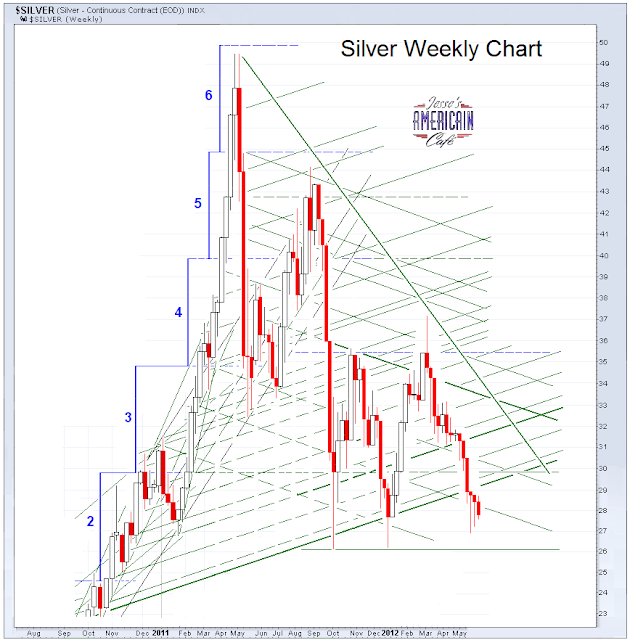"Is there a greater tragedy imaginable than that, in our endeavour consciously to shape our future in accordance with high ideals, we should in fact unwittingly produce the very opposite of what we have been striving for?"
Friedrich Hayek
I don't know if I would call that a great tragedy, or a greater irony. It most likely depends on the spirit with which one undertakes that endeavour to shape the future, rather than the words that express the ideals. Words turn into mere slogans, and people are often fooled, but God will not be mocked.
I like to think of the tendency of people to destroy themselves through excess as the 'Tsar Nicholas II Syndrome,' the drive to continue to hold and expand your grasp on unsustainable wealth and power for its own sake, even as it leads you and your family to a cruel death in a cellar, but with jewels sewn into the children's clothes. Winning.
It is the very basis of tragedy. Those traits and circumstances that make a person successful, and raise them to great heights, when taken to an excess that causes them to lose the sight of true value and balance, hamartia, becomes the very instrument of their own destruction.
I think Joe Stiglitz is attempting to put this in economic terms, to show the impracticality of the continuing deterioration of the American social fabric through public and tax policies with their roots in the 1980s.
Simon Johnson has recently written something similar from a slightly different perspective: Jamie Dimon and the Fall of Nations.
This long developing imbalance and erosion of equitable economic justice has led to a chasm of wealth and power, a distortion of the political system, and dangerously unstable social conditions in the developed world more usually seen in the Third World.
And this is a recipe for disaster. But even so, the monied interests may again make the offer that they think cannot be refused: 'Do as we say, or everything burns.'
I don't think the arguments of Stiglitz and Johnson will be successful in their appeal to reason, but I hope for it. At least the effort is being made in the States. When I watch the televised news I see people utterly possessed by insatiable greed and madness, who will say and do anything to get what they want. The current crop of political leaders throughout the Western world is a freak show. Europe and the UK may be a lost cause already, ready to heave themselves into the abyss with a spasm of despair.
One cannot reason someone back to rationality when they have been taken to a mad place through an excess of unrestrained desires.
And madness breeds madness, and will serve none but itself.
Vanity Fair
The One Percent's Problem
By Joseph Stiglitz
Let’s start by laying down the baseline premise: inequality in America has been widening for decades. We’re all aware of the fact.
Yes, there are some on the right who deny this reality, but serious analysts across the political spectrum take it for granted. I won’t run through all the evidence here, except to say that the gap between the 1 percent and the 99 percent is vast when looked at in terms of annual income, and even vaster when looked at in terms of wealth—that is, in terms of accumulated capital and other assets.
Consider the Walton family: the six heirs to the Walmart empire possess a combined wealth of some $90 billion, which is equivalent to the wealth of the entire bottom 30 percent of U.S. society. (Many at the bottom have zero or negative net worth, especially after the housing debacle.) Warren Buffett put the matter correctly when he said, “There’s been class warfare going on for the last 20 years and my class has won.”
So, no: there’s little debate over the basic fact of widening inequality. The debate is over its meaning. From the right, you sometimes hear the argument made that inequality is basically a good thing: as the rich increasingly benefit, so does everyone else. This argument is false: while the rich have been growing richer, most Americans (and not just those at the bottom) have been unable to maintain their standard of living, let alone to keep pace. A typical full-time male worker receives the same income today he did a third of a century ago.
From the left, meanwhile, the widening inequality often elicits an appeal for simple justice: why should so few have so much when so many have so little? It’s not hard to see why, in a market-driven age where justice itself is a commodity to be bought and sold, some would dismiss that argument as the stuff of pious sentiment.
Put sentiment aside. There are good reasons why plutocrats should care about inequality anyway—even if they’re thinking only about themselves. The rich do not exist in a vacuum. They need a functioning society around them to sustain their position. Widely unequal societies do not function efficiently and their economies are neither stable nor sustainable. The evidence from history and from around the modern world is unequivocal: there comes a point when inequality spirals into economic dysfunction for the whole society, and when it does, even the rich pay a steep price.
Let me run through a few reasons why...
Read the rest here.






































